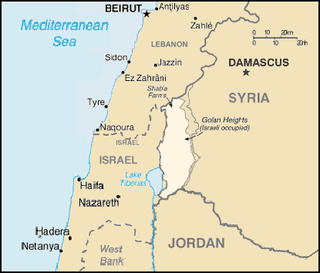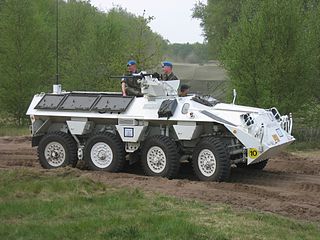
United Nations Security Council resolution 497, adopted unanimously on 17 December 1981, declared that the Israeli Golan Heights Law, which effectively annexed the Golan Heights, is "null and void and without international legal effect" and further calls on Israel to rescind its action.
A United Nations resolution is a formal text adopted by a United Nations (UN) body. Although any UN body can issue resolutions, in practice most resolutions are issued by the Security Council or the General Assembly.

United Nations Security Council Resolution 435, adopted on September 29, 1978, put forward proposals for a cease-fire and UN-supervised elections in South African-controlled South West Africa which ultimately led to the independence of Namibia. Importantly, it established the United Nations Transition Assistance Group (UNTAG) which oversaw the election and the South African withdrawal.

United Nations Security Council resolution 520, adopted unanimously on 17 September 1982, after the assassination of Lebanese President Bashir Gemayel and reaffriming resolutions 508 (1982), 509 (1982) and 516 (1982), the Council demanded that Israel withdraw immediately from Lebanon, and that Lebanese sovereignty be respected in order to restore a stable government in Lebanon.

United Nations Security Council Resolution 426, adopted on March 19, 1978, written the same day as resolution 425, approved of the Secretary-General's report on its implementation and in-turn established the United Nations Interim Force in Lebanon for 6 months, to continue operation thereafter if the Council so decides.
The official languages of the United Nations are the six languages that are used in UN meetings, and in which all official UN documents are written. In alphabetical order, they are:

United Nations Security Council resolution 500, adopted on 28 January 1982, after considering an item on the agenda of the Council and given the lack of unanimity amongst its permanent members, the Council decided to call an emergency meeting of the United Nations General Assembly to discuss the Israeli occupation of the Golan Heights.

United Nations Security Council resolution 523, adopted on 18 October 1982, after recalling resolutions 425 (1978), 426 (1978), 508 (1982), 509 (1982) and 519 (1982), as well as studying the report by the Secretary-General on the United Nations Interim Force in Lebanon (UNIFIL), the Council decided to extend the mandate of UNIFIL until 19 January 1983.

United Nations Security Council resolution 529, adopted on 18 January 1983, after recalling resolutions 425 (1978), 426 (1978), 508 (1982), 509 (1982) and 519 (1982), as well as studying the report by the Secretary-General on the United Nations Interim Force in Lebanon (UNIFIL), the Council decided to extend the mandate of UNIFIL until 19 July 1983.

United Nations Security Council resolution 768, adopted unanimously on 30 July 1992, after recalling previous resolutions on the topic including 501 (1982), 508 (1982), 509 (1982) and 520 (1982) as well as studying the report by the Secretary-General on the United Nations Interim Force in Lebanon (UNIFIL) approved in 426 (1978), the Council decided to extend the mandate of UNIFIL for a further six months until 31 January 1993.

United Nations Security Council resolution 803, adopted unanimously on 28 January 1993, after recalling previous resolutions on the topic including 501 (1982), 508 (1982), 509 (1982) and 520 (1982) as well as studying the report by the Secretary-General on the United Nations Interim Force in Lebanon (UNIFIL) approved in 426 (1978), the Council decided to extend the mandate of UNIFIL for a further six months until 31 July 1993.
United Nations Security Council resolution 852, adopted unanimously on 28 July 1993, after recalling previous resolutions on the topic including 501 (1982), 508 (1982), 509 (1982) and 520 (1982) as well as studying the report by the Secretary-General on the United Nations Interim Force in Lebanon (UNIFIL) approved in 426 (1978), the Council decided to extend the mandate of UNIFIL for a further six months until 31 January 1994.

United Nations Security Council resolution 938, adopted on 28 July 1994, after recalling previous resolutions on Israel and Lebanon including 501 (1982), 508 (1982), 509 (1982) and 520 (1982) as well as studying the report by the Secretary-General Boutros Boutros-Ghali on the United Nations Interim Force in Lebanon (UNIFIL) approved in 426 (1978), the Council decided to extend the mandate of UNIFIL for a further six months until 31 January 1995.

United Nations Security Council Resolution 1732, adopted unanimously on December 21, 2006, after welcoming a report by a working group established by the Security Council, the Council took note of its findings and decided that it had fulfilled its mandate.
United Nations Security Council Resolution 1802 was unanimously adopted on 25 February 2008.
United Nations Security Council Resolution 1868 was unanimously adopted on 23 March 2009.

United Nations Security Council Resolution 2068 was adopted on 19 September 2012. It declared the readiness of the United Nations Security Council to impose sanctions on armed groups persistently violating the human rights of children including child abuse and child soldier.













